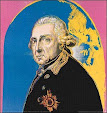On August 3, 2013 we convened in Brown Deer, Wisconsin to resume our Iberian Campaign between Major General William Justinian Pettygree and Marshal Soult (the Duke of Damnation, Himself) near the village of Aveiro, just south of the Douro River in Portugal. A very good battle report is provided on the Campaigns in Iberia blog:
My brief report will post some of the pictures that I snapped of the British relief column, on the right flank of the British defensive position in Averiero. As I recall, Brigadier General Kinch had marched north from Lisbon with the intention of linking up with Pettygree's two brigades of infantry and one brigade of light cavalry. The Duke of Damnation had apparently stolen a march on Pettygree and was descending on Kinch's position with two full divisions of French infantry and gobs of cavalry. Kinch was to hold on until relieved, or withdraw from the town, at his discretion, if it meant saving his brigade from destruction.
My role, as Brigadier General Alexander Sinclair, as one of the two infantry brigades in Pettygree's main army, was to advance from the right flank (the French left) and intercept any French forces to my front. Brigadier Peter Young's brigade (5th and 9th Regt.s) and Paget's light cavalry brigade was deployed to my left and those two brigades were to make the primary thrust to relieve Kinch's brigade in Aveiro.
 |
| The French left comes over the ridge, with a screen of chasseurs a cheval covering their front. |
 |
| The French brigade advances forward. They don't see anything yet, or do they? Note that the chasseurs have now formed into close order squadrons. |
 |
| The French chasseurs see the vanguard of Paget's light cavalry brigade arriving on the field to their left. |
 |
| Sinclair's brigade is screened by a company of the 5/60th Rifles and the light company of the 2/83rd Regiment. They find a company of French voligeurs in the woods. |
 |
| Brigadier Young's brigade (5th and 9th regiments) attack the front of the French brigade, which is now formed with a dangerous bend in their battle line. This is not a good situation for the French. |
Towards the end of the battle, the French left hand brigade of infantry decided that it would be best to disengage as best they could. Their chasseurs a cheval covering their front while the infantry battalions fell back to the back table.
Lt. Colonel Gordon was content to watch les Crapauds retire without moving his regiment closer and risking needless casualties. When your foe is doing what you desire of him (in this case, retreating) it is best not to intefere in his plans. So the 83rd was content to herd the French off the battlefield with no more loss of life. In a campaign, where casualties reduce your effectiveness in the next game, there is a time to attack and a time to hold back.
Sinclair's activity was limited in this game. His skirmishers and supporting section of Royal Artillery, commanded by Lt. Harry Pearson, did most of the damage to the French. The French commander in this sector appeared to be protecting the left flank of the main French assault on the village of Aveiro, so he did not advance up the British held ridge to his front or be overly aggressive, i.e. rash. He played his hand the correct way, in Sinclair's opinion.
Tomorrow is always another day.
I have no idea of what happened in Aveiero as it was too far away from Sinclair's position. I have heard that Brigadier Kinch held off the French attack for several hours, before finally retiring from the village. The French brigade, though, was badly mauled in the attack, as was Kinch. Both of the brigades in this sector had casualties approaching 40-50%, from what I could tell from a distance. It was a very bloody affair.








Beautiful pictures and great report...
ReplyDeleteYes! Just the sort of thing for the final day of summer vacation.
ReplyDeleteBest Regards,
Stokes
Excellent report. I would love to try a campaign game like this.
ReplyDeleteMarvellous stuff Fritz! Well done as always. What do you use as your terrain mat? Is it commercially available? And what do you stick under it to give such a natural look to the hills and high ground?
ReplyDeleteThanks!
Steve